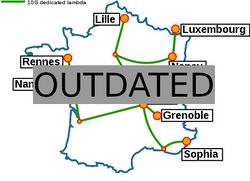Grid5000:Home
|
Grid'5000 is a large-scale and versatile testbed for experiment-driven research in all areas of computer science, with a focus on parallel and distributed computing including Cloud, HPC and Big Data. Key features:
|
Five random publications that benefited from Grid'5000 (at least 2932 overall):
- Reda Khoufache, Anisse Belhadj, Hanene Azzag, Mustapha Lebbah. Distributed MCMC inference for Bayesian Non-Parametric Latent Block Model. Pacific-Asia Conference on Knowledge Discovery and Data Mining (PAKDD), May 2024, Taipei, Taiwan. hal-04457575 view on HAL pdf
- Chanattan Sok, Laurent d'Orazio, Reyyan Tekin, Dimitri Tombroff. WebAssembly serverless join: A Study of its Application. International Conference on Scientific and Statistical Database Management (SSDBM), Jul 2024, Rennes France, France. pp.1-4, 10.1145/3676288.3676305. hal-04722875 view on HAL pdf
- Georges da Costa, Atom Deutsch-Filippi, Igor Fontana de Nardin, Jean-Marc Nicod, Veronika Rehn-Sonigo, et al.. Cooperative vs. non-cooperative marketplace for computing jobs to be run on geo-distributed data centers only supplied by renewable energies. Cluster Computing, 2025, 28 (10), pp.637. 10.1007/s10586-025-05300-5. hal-05239473 view on HAL pdf
- Anas Mokhtari, Baptiste Jonglez, Thomas Ledoux. Towards Digital Sustainability: Involving Cloud Users as Key Players. IC2E 2024 - 12th IEEE International Conference on Cloud Engineering, Sep 2024, Paphos, Cyprus. pp.126-132, 10.1109/IC2E61754.2024.00021. hal-04633237 view on HAL pdf
- Adrien Berthelot, Eddy Caron, Mathilde Jay, Laurent Lefèvre. Estimating the environmental impact of Generative-AI services using an LCA-based methodology. CIRP LCE 2024 - 31st Conference on Life Cycle Engineering, Jun 2024, Turin, Italy. pp.1-10. hal-04346102v2 view on HAL pdf
Latest news
Failed to load RSS feed from https://www.grid5000.fr/mediawiki/index.php?title=News&action=feed&feed=atom: Error parsing XML for RSS
Grid'5000 sites
Current funding
As from June 2008, Inria is the main contributor to Grid'5000 funding.
INRIA |
CNRS |
UniversitiesUniversité Grenoble Alpes, Grenoble INP |
Regional councilsAquitaine |


